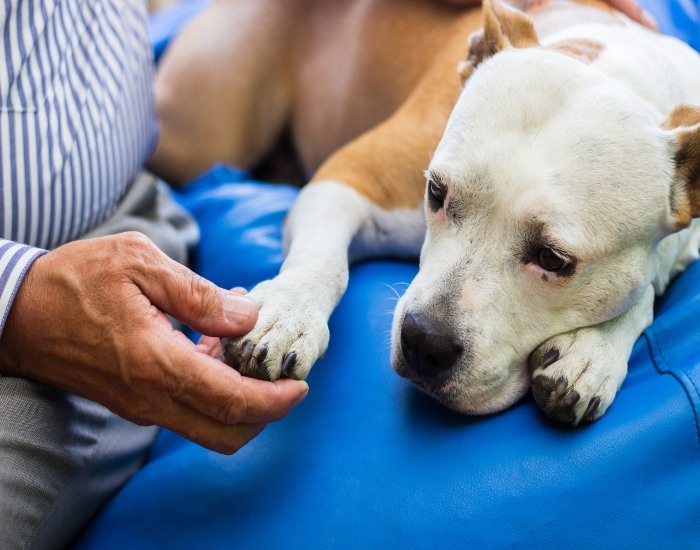Common Health Issues to Look Out for in Senior Dogs
Health Problems in Elderly Dogs
As your beloved canine companion enters their golden years, it’s important to keep a closer eye on their health. Just like humans, senior dogs are prone to more health problems as they age. Fortunately, with the proper care and attention, your furry friend can remain comfortable and happy. Here are some of the most common health problems in senior dogs so you know what to look out for.

Cancer in Senior Dogs
Cancer is a significant concern in older dogs. In fact, nearly half of all dogs over age 10 will develop cancer. Some of the most common forms of cancer in dogs include mast cell tumors, lymphoma, hemangiosarcoma, squamous cell carcinoma, oral melanomas, and osteosarcoma.
Cancer presents various symptoms depending on its form and location. Common signs include:
- Lethargy
- Vomiting, diarrhea, and weight loss
- Difficulty going to the bathroom
- Skin changes
- Bleeding from the mouth, nose, or elsewhere
Diagnosing cancer in dogs involves blood work, X-rays, and biopsies. Treatment often includes chemotherapy, which is surprisingly well-tolerated by dogs compared to humans.
Heart Disease in Senior Dogs
Congestive heart failure (CHF) is a common issue among senior dogs. Causes range from congenital defects to heartworms to nutritional deficiencies. Symptoms include:
- Panting
- Fatigue
- Coughing
- Fluid accumulation in the body
Early stages of heart disease manifest few symptoms, making regular vet checks crucial. Treatment varies based on the underlying cause but may include medications like ACE inhibitors and diuretics.
Kidney Disease in Senior Dogs
Kidney disease is a common senior dog health problem. It can manifest as a decrease in kidney function due to age or underlying conditions. Symptoms of kidney disease in dogs include:
- Increased thirst and urination
- Vomiting and weight loss
- Lethargy
- Decreased appetite
- Poor fur condition
Kidney disease can often be managed with proper care. Blood and urine tests are essential tools for diagnosis. Treating kidney disease in dogs typically involves dietary management and fluid therapy.
Urinary Tract Disease in Senior Dogs
Urinary tract disease encompasses a range of issues, including incontinence, infections, and bladder stones. Symptoms to watch for in your senior dog include:
- Difficulty or pain during urination
- Frequent urination
- Blood in the urine
- Accidents in the house
Incontinence is particularly common in older female dogs and may be due to weakened bladder muscles or hormonal imbalances. Urinary tract infections (UTIs) are also a frequent problem, requiring prompt treatment with antibiotics. Bladder stones may require dietary changes or surgery.
Liver Disease in Senior Dogs
Liver disease can manifest in senior dogs because of infections, exposure to toxins, or underlying health conditions. Symptoms may include:
- Vomiting and diarrhea
- Loss of appetite
- Jaundice (yellowing of the skin and eyes)
- Disorientation or seizures
Blood tests are needed to diagnose liver disease in dogs. Ultrasound and biopsies can also determine the cause and extent of the liver damage. Treatment may include medications, dietary modifications, and surgery.
Diabetes in Senior Dogs
Diabetes is a common issue in older dogs, occurring when the body cannot properly use glucose due to a lack of insulin. Symptoms include:
- Increased thirst
- Increased urination
- Weight loss despite an increased appetite
- Lethargy
- Dull coat
Diagnosis is based on persistent high glucose levels in the blood and urine. Managing diabetes in dogs typically involves insulin injections, which most pet owners can learn to administer at home. Dietary management and regular exercise are also crucial.
Obesity in Senior Dogs
Obesity affects over half of dogs in the US, and senior dogs are particularly likely to pack on the pounds due to decreased activity, slower metabolism, and underlying health issues. Signs of obesity include:
- Visible weight gain
- Difficulty feeling the ribs under the fat
- Lack of a defined waist
Maintaining a healthy weight is important to prevent other health problems and can significantly improve your senior dog’s quality of life. Prevention and management include regular exercise and a balanced diet. Regular weigh-ins at the vet or at home help you track your dog’s weight.
Why Choose Us?
Caring for a senior dog brings unique joys and challenges. Whether your senior dog needs obedience refreshment or behavioral adjustments, Hilton Butler has a variety of training services to suit your needs.
They say you can’t teach an old dog new tricks, but our family-owned and operated business is committed to enhancing the lives of dogs and their families in the DFW area, regardless of age. We promise to provide the best care and training for your canine companion. Contact us today at (972) 747-9977 to learn more about supporting a happier, healthier life for your senior dog.
